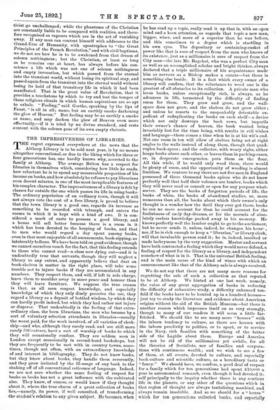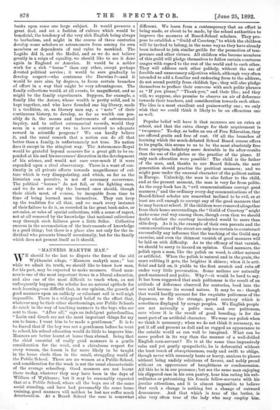THE IMPRESSIVENESS OF LIBRARIES.
THE regret expressed everywhere at the news that the Althorp Library is to be sold next year, is by no means altogether conventional, or due to the liking which for three or four generations has, one hardly knows why, accreted to the family at Althorp. The average Briton has a respect for libraries in themselves which, considering how little he reads, how reluctant he is to spend any measurable proportion of his income on books, and how absolutely he refuses to pay librarians even decent salaries, is one of the most inexplicable features of his complex character. The impressiveness of a library is felt by classes far outside the one which passes its life in using books- The ordinary population of an ordinary town, though it will not always vote the cost of a free library, is proud to believe that the town library is a good one, regards its increase as something to be recorded with triumph, and enters the rooms in which it is kept with a kind of awe. It is con- sidered a mark of caste to possess a good library, and a house will sell better because there is a room in it which has been devoted to the keeping of books, and that to men who would regard a day spent among books, even in that most enjoyable of all amusements, book-sipping, as intolerably tedious. We have been told on good evidence, though we cannot ourselves vouch for the fact, that this feeling extends to those who cannot read—a class now dying out—and it is undoubtedly true that servants, though they will neglect a library to any extent, and apparently believe that dust on book-shelves is matter in the right place, will take some trouble not to injure books if they are accumulated in any numbers. They respect them, and will, if left in sole charge, leave them to moulder away in more peace and honour than they will leave furniture. We suppose the true reason is that, as all men respect knowledge, and especially knowledge of which they only dimly perceive the use, they regard a library as a deposit of bottled wisdom, by which they can hardly profit indeed, but which they had rather not injure or disperse. That undoubtedly is the feeling of that extra- ordinary class, the born librarians, the men who become by a sort of voluntary selection attendants in libraries—usually the worst paid, for the work involved, of all varieties of clerk- ship—and who, although they rarely read, and are still more rarely litterateurs, have a sort of warship of books to which they will occasionally confess. They are seldom seen in London except occasionally in second-hand bookshops, but they are frequently to be met with in country towns, some- times, though not often, with an extraordinary knowledge of and interest in bibliography. They do not know books, but they know about books, they handle them reverently, and they grow irritated by the ill-usage of any book to the shaking off of all conventional reticence of language. Indeed, we are not sure whether the same feeling of respect for books as books has not a great influence with the cultivated also. They know, of course, or would know if they thought about it, where the true charm of a great collection of books lies,—namely, its power, if well consulted, of transforming the student's relation to any given subject. He becomes, when he has read up a topic, really read it up that is, with an open mind and a keen attention, as regards that topic a new man, bigger, wiser, and more of a superior than he was before, and this sometimes to a degree which is startling in his own eyes. The depositary or containing-casket of power like tbat is sure of respect from the man who knows of its existence, just as a millionaire is sure of respect from the City man—the late Mr. Bagehot, who was a perfect City man as well as an accomplished scholar and bright thinker, always declared that a triple millionaire of his acquaintance made him as nervous as a Bishop makes a curate—but there is something else beside. It is a fact which every owner of a library will confirm, that the reluctance to weed one is the greatest of all obstacles to its collection. A private man who loves books, unless exceptionally rich, is always, as he advances in life, tormented by the difficulty of finding room for them. They grow and grow, and the wall- space does not grow, and the shelves do not grow either ; and unless he resorts to the unspeakably detestable ex- pedient of reduplicating the books on each shelf— a device which not only destroys the back rows, but imperils their owner's chance of heaven, the book wanted being invariably lost for the time being, with results in evil wishes and language—there comes a time when he is at his wit's end. Not one room in ten will allow of shelves being set at right angles to the walls instead of along them, though that quad- ruples book-space ; and the collector, with weary sighs, either heaps books above each other, or leaves them in packing-cases, or, in desperate emergencies, puts them on the floor. All this while, if he would only weed them, there would be plenty of room, and the opportunity of weeding is almost limitless. We venture to say there are not five men in England possessed of three thousand books apiece who do not know perfectly well that half their volumes are lumber, books which they will never read or consult or open for any purpose what- soever. They are the books of forgotten periods of life, the books of whim, the books of abandoned studies, or, more numerous than all, the books about which their owner's only thought is a wonder how the devil they ever got there, books he can no more account for than he could account for the foolishness of ea] ly day-dreams, or for the morsels of abso- lutely useless knowledge packed away in his memory. He knows perfectly well the lumber ought to go to the auctioneer, but he never sends it, unless, indeed, be changes his hone,- , nor, if he is rich enough to keep a " librarian," or library clerk, will that invaluable person send it ; he is, indeed, insulted or made lachrymose by the very suggestion. Master and servant have both contracted a feeling which they would never defend, a feeling of respect for the library as a library, and independent somehow of what is in it. That is the universal British feeling, and is the main cause of the kind of wince with which an announcement like that of the Althorp sale is always received.
We do not say that there are not many more reasons for regretting the sale of such a collection as that reputed to be at Althorp. We hinted at one last week, namely, the value of any great aggregation of books in reducing the difficulty of exhaustive study, a difficulty enhanced ten- fold if the books have to be hunted up in a hundred houses— just try to study the literature and evidence about American origins without the aid of the British I/Inseam—but there is another reason which impresses itself on us very strongly, though to many of our readers it will seem a little far- fetched. We should like to see many more " houses " with the inborn tendency to culture, as there are houses with the inborn proclivity to politics, or to sport, or to service in the Navy, rich families with something of the better side of the Lagidse about them. Europe and America will not be rid of the millionaires yet awhile, for all the theories of Socialists, nor of families and corpora- tions with continuous wealth ; and we wish to see a few of them, at all events, devoted to culture, and especially book-culture and scientific culture, as a hereditary taste or " fancy." We should have, we confess, a good deal of respect for a family which for ten generations bad spent £10,000 a year in astronomical research, even though it had devoted it- self principally to the inquiry whether there is any sentient life in the planets, or any other of the questions which in that region of thought are always tantalising mankind, and always remain insoluble. And so we should for a " house " which for ten generations collected books, and especially
books upon some one large subject. It would preserve a great deal, and set a fashion of culture which would be beneficial, the tendency of the very rich English being always to barbarism, and might in the course of three centuries develop some scholars or astronomers from among its own members or dependents of real value to mankind. The Lagidte did it, and the Medici, and as we do not believe greatly in a reign of equality, we should like to see it done again in England or America. It would be a nobler work for a rich " house " than any other, except perhaps devoted political service ; it would be sure gradually to develop respect—who contemns the Darwins ?—and it would be sure also, by degrees, to focus certain branches of effort in a way that might be very advantageous. The family collections would, at all events, be magnificent, and so might be the family experiments. Suppose, for example, a family like the Astors, whose wealth is pretty solid, and is kept together, and who have founded one big library, made it a tradition, or, as literary men say, a " note " of their continuous history, to develop, so far as wealth can pos- sibly do it, the means and instruments of astronomical inquiry, and to collect astronomical records, would they seem in a century or two to have secured no adequate reward in scientific progress P We can hardly believe it, and the usual remark that a nation can do all that better than a family, is unfortunately not true. No nation does it except in the stingiest way. The Astronomer-Royal would be grateful beyond measure for a great gift to be ex- pended at his and his successors' discretion in the development of his science, and would not care over-much if it were expended upon a rival observatory. There is a want of con- tinuity in all private efforts towards magnificence of cul- ture which is very disappointing, and which, so far as the historian can perceive, is not of necessary occurrence. The political " houses " do not fail, or the fighting ones, and we do not see why the learned ones should, though their chiefs must, of course, be incapable from time to time of being learned men themselves. They can keep up the tradition for all that, and we mark every instance of their failure to do it, as recorded in the great book-sales, or art-sales, or sales of special collections, with a sense of regret, not at all removed by the knowledge that national collections may through such failures grow a little fuller. Collective success in the accumulation of the instruments of knowledge is a good thing; but there is a place also not only for the in- dividual who presents himself occasionally, but for the family which does not present itself as it should.



































 Previous page
Previous page